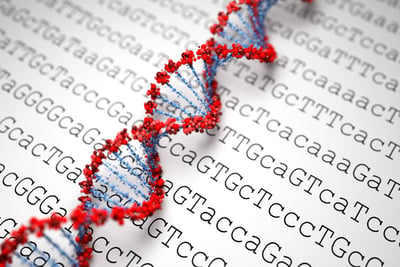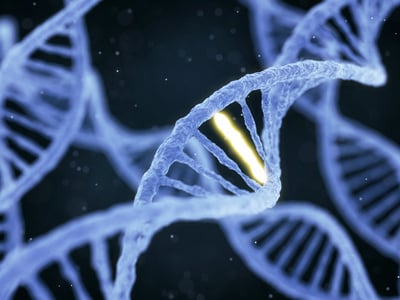FORCE's eXamining the Relevance of Articles for You (XRAY) program looks behind the headlines of cancer news to help you understand what the research means for you.
XRAY is a reliable source of hereditary cancer research-related news and information.
Learn more about the XRAY program
Keyword: rad51, In portal: Breast Cancer
Relevance: High


Strength of Science: High


Research Timeline: Post Approval


Study : Frequency of inherited mutations linked to breast cancer are similar in Black and white women
Relevance: High


Strength of Science: High


Research Timeline: Post Approval


Most relevant for: Non-Hispanic Black and white women with breast cancer
The CARRIERS study looked at the rate of inherited mutations in women with and without breast cancer. In an extension of the CARRIERS study, researchers found no difference in the frequency of inherited mutations in breast cancer genes among Black and white women with breast cancer. A few individual genes differed in frequency: BRCA2 and PALB2 mutations were seen more often in Black women, while CHEK2 mutations were seen less often. Researchers concluded that race should not be used to determine who is referred for genetic testing. (posted 8/13/21)
Este artículo está disponible en español.
Read More
Relevance: Medium-High


Strength of Science: Medium-High


Research Timeline: Human Research


Study : Promising research using a PARP inhibitor to treat metastatic breast cancer in people with an inherited PALB2 mutation or a tumor mutation in BRCA1 or BRCA2
Relevance: Medium-High


Strength of Science: Medium-High


Research Timeline: Human Research


Most relevant for: People with metastatic breast cancer with an inherited mutation in PALB2 or tumor with a BRCA mutation
Early results of a small study showed that women with metastatic breast cancer and an inherited mutation in PALB2 or an acquired tumor mutation in BRCA1 or BRCA2 benefitted from the PARP inhibitor olaparib (Lynparza). (6/18/20)
Read More
Relevance: Medium-High


Strength of Science: Medium


Research Timeline: Post Approval


Study : Inherited mutations in metastatic breast cancer patients
Relevance: Medium-High


Strength of Science: Medium


Research Timeline: Post Approval


Most relevant for: People with metastatic breast cancer
Recent research shows that a significant portion of patients with metastatic breast cancer have harmful mutations in a gene associated with hereditary breast cancer and increased breast cancer risk. (9/26/19)
Read More
Relevance: Medium-High


Research Timeline: Post Approval


Guideline : Breast surgeons recommend genetic testing for all breast cancer patients
Relevance: Medium-High


Research Timeline: Post Approval


Most relevant for: Anyone diagnosed with breast cancer
The American Society of Breast Surgeons published statement on genetic testing for hereditary breast cancer on February 10, 2019. It includes recommendations about who should be tested. Among these is the recommendation that all breast cancer patients get genetic testing, as well as women who do not have breast cancer but fit the National Comprehensive Cancer Network (NCCN) guidelines. (3/25/19)
Read More
Relevance: Medium-High


Strength of Science: High


Research Timeline: Post Approval


Study : Inherited breast cancer in Nigerian women
Relevance: Medium-High


Strength of Science: High


Research Timeline: Post Approval


Most relevant for: Nigerian women or women of Nigerian descent who have breast cancer
A new study shows that among Nigerian women, one in eight cases of breast cancer is due to an inherited mutation in BRCA1, BRCA2, PALB2 or TP53. (12/5/18)
Read More
Relevance: Medium-High


Strength of Science: Medium-High


Research Timeline: Post Approval


Study : Study identifies genes associated with risk of triple-negative breast cancer
Relevance: Medium-High


Strength of Science: Medium-High


Research Timeline: Post Approval


Most relevant for: People diagnosed with triple-negative breast cancer
Panel testing can identify women who are at increased risk for breast cancer. However, those at risk for triple-negative breast cancer cannot easily be identified because other than BRCA1, genes that increase the risk for triple-negative breast cancer are unknown. A new study uses panel testing to identify which genes increase the risk for triple-negative breast cancer. (8/23/18)
Read More
Study : Removing ovaries before age 50 may increase the risk of chronic conditions for some women
Most relevant for: Women under 50 years of age who have had or are considering removing their ovaries
Removal of ovaries and fallopian tubes prevents ovarian cancer, but it may come with other health risks. Experts recommend removal of ovaries and fallopian tubes in women at high risk for ovarian cancer due to inherited mutations in BRCA or other genes linked to ovarian cancer risk. For these high-risk women the benefit of ovarian cancer prevention outweighs the risk of long-term complications. Based on a recent study, some researchers feel that for women who are not at increased risk for cancer, the risk for some chronic conditions is too high to consider removal of both ovaries. (11/1/16)
Read More
Relevance: Medium


Strength of Science: Medium-High


Research Timeline: Post Approval


Study : What are the genetics underlying 12 different cancer types?
Relevance: Medium


Strength of Science: Medium-High


Research Timeline: Post Approval


Most relevant for: People diagnosed with cancer
As gene sequencing has become more affordable, researchers and health care providers are now looking for mutations in many genes beyond BRCA1, BRCA2 and others that are associated with known hereditary cancer syndromes. By sequencing thousands of genes rather than just one or two, researchers can better understand which inherited mutations affect cancer risk. In this study, researchers sequenced thousands of genes in patients with one of 12 cancers, including breast, and catalogued which gene mutations are most commonly found in each cancer. (03/01/16)
Read More